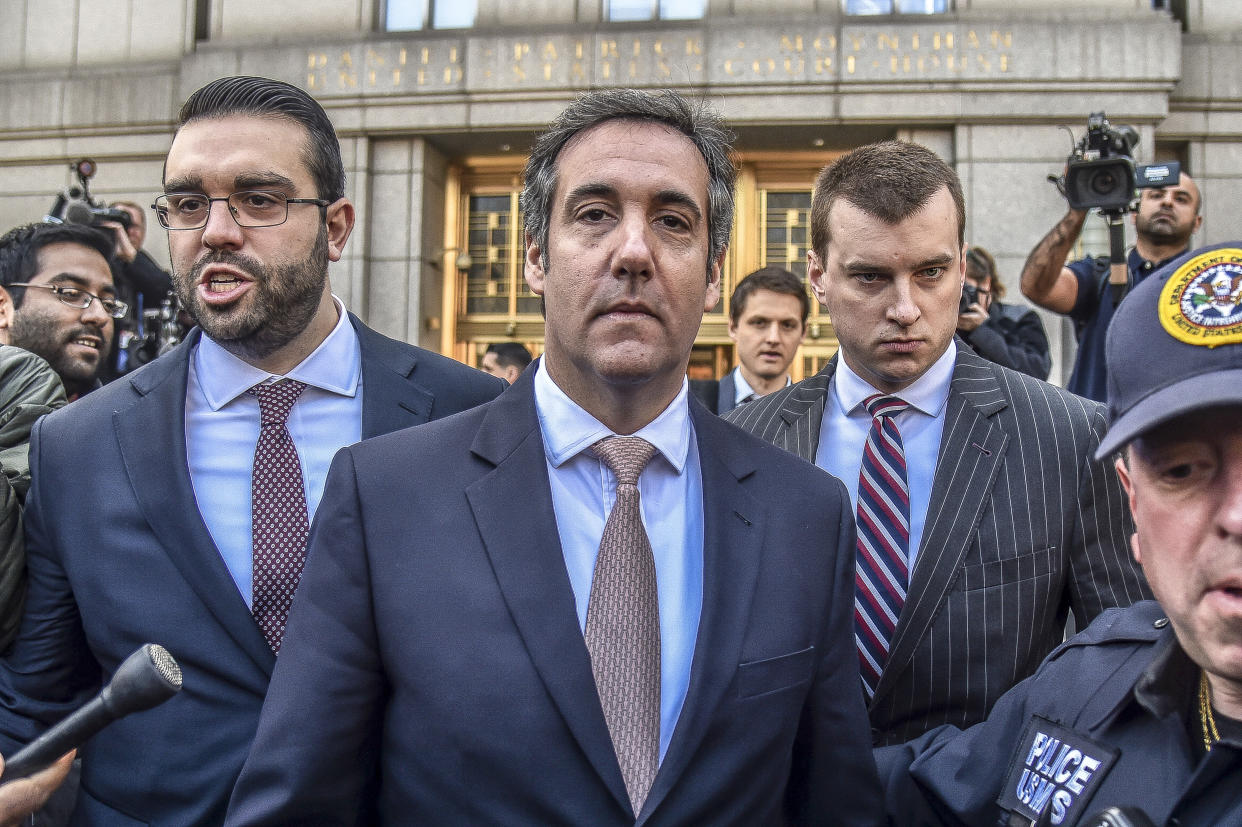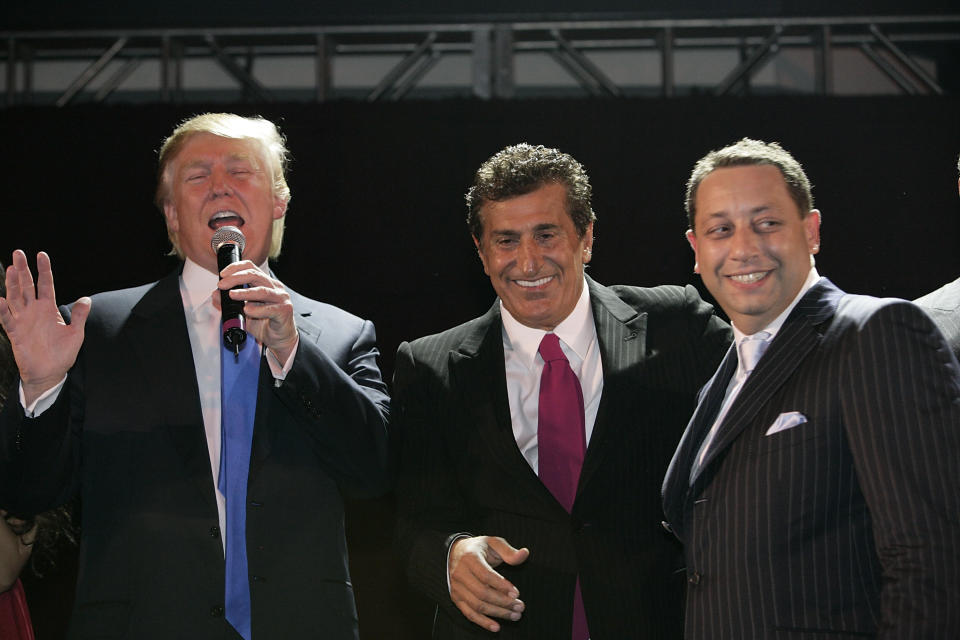Michael Cohen's efforts to build a Trump Tower in Moscow went on longer than he has previously acknowledged

WASHINGTON — Prosecutors and congressional investigators have obtained text messages and emails showing that President Trump’s personal attorney, Michael Cohen, was working on a deal for a Trump Tower in Moscow far later than Cohen has previously acknowledged. The communications show that as late as May 2016, around the time Trump was clinching the Republican nomination, Cohen was considering a trip to Russia to meet about the project with high-level government officials, business leaders and bankers.
Cohen has said that, beginning in September 2015, he worked with a Russian-born developer named Felix Sater to build a luxury hotel, office, and apartment complex called Trump World Tower Moscow. In a statement to Congress, Cohen claimed he gave up on the project in late January 2016, when he determined the “proposal was not feasible for a variety of business reasons and should not be pursued further.”
However, Yahoo News has learned that text messages and emails that Sater provided to the government seem to contradict Cohen’s version of events. The communications show Cohen was discussing the deal until at least May 2016.
Multiple sources have described to Yahoo News the texts and emails with Cohen that Sater has provided to the government. Sater confirmed to Yahoo News that he provided all of his texts and emails with Cohen to special counsel Robert Mueller’s team as well as to the House Intelligence Committee and the Senate’s Intelligence and Judiciary committees.
Sater also confirmed that his communications chronicled his extensive efforts to get the tower built.
“I was trying to build the tallest tower in Europe. For me, it was a business transaction,” Sater told Yahoo News.
“I have fully cooperated with every investigation and every committee. I have provided absolutely everything voluntarily, and not under subpoena, that was asked of me and will continue to willingly cooperate. All my communications show I was tenaciously trying to get a supertall tower built and nothing else.”

Cohen and his attorneys have not responded to requests for comment on this story.
Mueller’s probe into Russian intervention in the 2016 election has increasingly turned its focus on Cohen, who spent over a decade as an executive at Trump’s company and became one of the future president’s closest confidantes. Cohen left the Trump Organization after Trump’s election, but he remained the president’s personal lawyer.
Sources familiar with the Mueller investigation have previously told Yahoo News that prosecutors working with Mueller have been asking questions about Cohen’s work to build the Moscow tower, his personal taxi business and his real estate portfolio, as well as payments to women who claimed they had affairs with Trump. Last month the FBI searched Cohen’s residences and office under a warrant obtained by federal prosecutors in New York, acting on a referral by Mueller. The warrant sought records related to Cohen’s personal business dealings and the payments to the women. Trump Tower Moscow was not covered by the warrant, which could indicate that Mueller has decided to keep that aspect of the investigation under his own control.
Sater, who first met Cohen when they were both in high school, worked with President Trump’s real estate company to build hotels in Florida and New York during the mid 2000s. At that time, he also discussed potential projects in Russia with Trump’s company. As part of his deal to build Trump-branded properties, Sater had a Trump Organization business card and an office in the company’s Manhattan headquarters. Sater was convicted on charges related to a stock fraud scheme orchestrated by Russian organized crime figures in 1998. He then became a federal informant who spent years providing crucial information to the government about mobsters and terrorists.
The emails and texts show Cohen and Sater began discussing a potential tower in Moscow in the second half of 2015. Sater said he could introduce Cohen to high-level figures in Russia, including bankers, business people and politicians. In emails that were published by the New York Times, Sater suggested that he could get the backing of Russian President Vladimir Putin and that the project could benefit both Trump’s chances of being elected and America’s relations with Moscow.
“I will get Putin on this program, and we will get Donald elected,” Sater wrote in a November 2015 email.
The emails and texts described to Yahoo News, which have not previously been made public, show Sater and Cohen continued discussing the deal into 2016. Sater was explicit that high-level figures in Russia needed to be involved because a project of this magnitude could not be completed without Putin’s approval. Around the start of that year, Cohen became frustrated because Sater had not been able to set up the necessary meetings. Cohen swore at Sater and said he would make his own high-level contacts in Russia.

As part of his efforts to pursue the Moscow project on his own, Cohen emailed top Kremlin spokesman Dmitry Peskov in mid-January 2016 requesting “assistance” for the tower development.
“Without getting into lengthy specifics, the communication between our two sides has stalled,” Cohen wrote.
The email was sent to a generic Kremlin press address, and Cohen has said did not receive a response. In a statement to the House Intelligence Committee, Cohen said he abandoned the Moscow project “for business reasons” in January 2016 when the company couldn’t get necessary government permissions. Cohen further said the decision to give up on the Moscow tower was not related to Trump’s presidential campaign.
But the communications Sater provided to Mueller’s team and three congressional committees paint a different picture of the deal. After Cohen made his own attempts to pursue the plan in January, the messages indicate that he continued to communicate with Sater about the potential project.
The pair continued talking between January and May of 2016, when Sater began pressing Cohen to travel to Russia to work on the deal. Sater encouraged Cohen to go to the St. Petersburg International Economic Forum in mid-June 2016. Sater presented the event as an opportunity for Cohen to meet top Russian officials, business leaders and bankers in one place. He obtained an invitation for Cohen, who indicated he was considering the trip but ultimately said any travel to Russia would have to take place after the Republican convention, which took place in July 2016.
They did not discuss the project further. In his statement to the House Intelligence Committee, Cohen said that Sater “constantly” encouraged him to go to Russia and that he declined to make the trip. The Washington Post previously reported that Sater invited Cohen to the forum. Cohen told the newspaper he “did not accept this invitation.”
According to Sater, he eventually gave up on the project in December 2016 when Trump, who had just been elected, said his company would do “no new deals” while he was in office.
Read more from Yahoo News:

